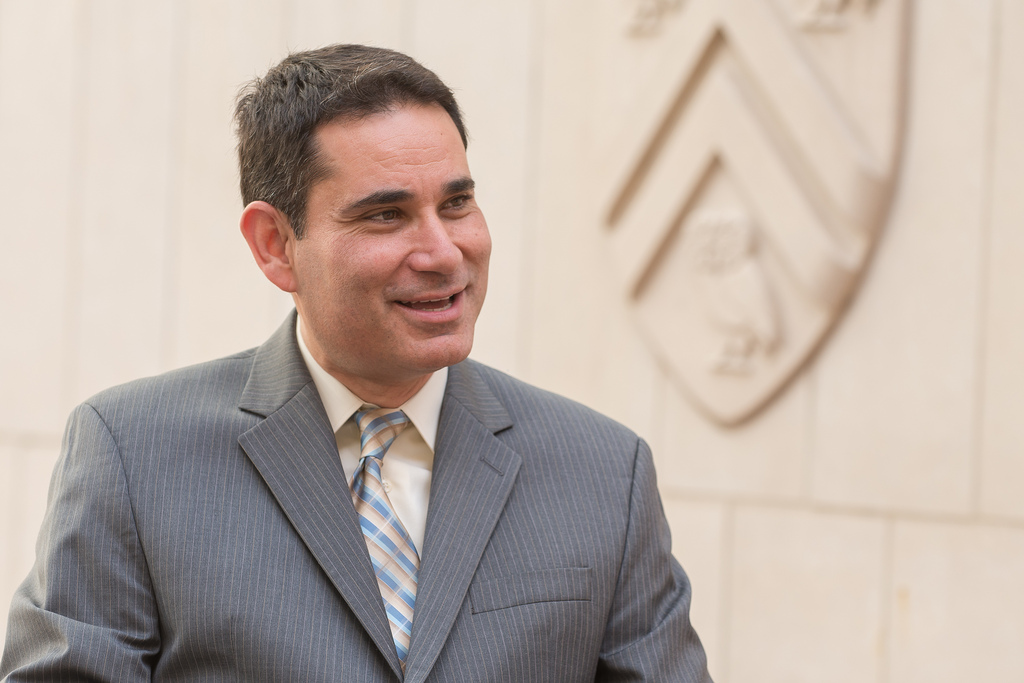
Political scientist Tony Payan is the fellow in Mexico studies and the director of the Mexico Center at the Baker Institute at Rice University in Houston. Before participating in a panel on how immigration reform might affect life in Houston, he explained how he likes his iced tea, why he considers himself lucky, and what it’s like to wake up without an alarm clock every morning.
If you could be anyone in history, who would you be?
Probably somebody like Franklin D. Roosevelt. Or somebody like Benito Juárez or Abraham Lincoln. Men who were at a very critical juncture with their surroundings, and they took control of it and did something really interesting and creative. Men who were not defeated by crises but rather changed the crises, turned them on their head, and made something out of it. It’s a little bit of the interaction between the man and his social environment, something like that.
What is your drink of choice?
I think black iced tea—without sugar—because I like bitter drinks. It’s a great drink. I enjoy some good bitter flavor in teas.
What Spanish word or phrase do you wish had an English equivalent?
That’s a very good question. I know I’ve thought of some. And I know many of them that have an English equivalent, because when I tweet I tweet in English, and then I repeat in Spanish, or I tweet in Spanish and retweet in English, and I’m always trying to give it an exact translation. … Lo que natura no da, Salamanca no presta. And the closest English equivalent is probably a “nature and nurture” kind of a thing. Salamanca—whatever you bring with you, the city’s not going to give to you.
When and why did you last cross the U.S.-Mexico border?
I crossed the border a week and a half ago on Friday—two weeks ago tomorrow—and I went to teach. I teacher in the Ph.D. program at Universidad Autónoma de Ciudad Juárez, and I go once a month to meet my students.
Who was your childhood hero?
I had some really odd heroes I think, do-gooders like Sinbad the Sailor and The Super Amigos—The Super Friends—and people like that who were always trying to do good. Kalimán was a great one, Kalimán was kind of a Middle Eastern figure, very much in the style of Indiana Jones. He was kind of an Indiana Jones but dressed in a turban, and he had a little companion, a boy, whose name was Solín. That was a major comic I read when I was a kid.
Do you consider yourself lucky?
Yes. I don’t believe in luck, but if I did, I would say I am an extremely lucky person. I have found myself in binds time and time again, and for some reason, when the knot is the hardest, when it’s the tightest, something happens that loosens it up. Something occurs. And it’s really amazing because that has happened throughout my life. So I’d rather say that I don’t believe in luck, but if I were to say that there was some sort of hand behind things, I would say yes.
Where do you come up with your best ideas?
In dialogue, talking to people, in deep conversation, exploring interesting ideas with colleagues and friends, and asking people questions. I don’t think I ever come up with good ideas, good questions, and good hypotheses when I’m by myself. It’s always when I’m talking to somebody, engaging in dialogue.
Who’s your favorite philosopher?
I’m a little ambivalent about that. I think maybe Friedrich Nietzsche, because I think he was a cynic, but I think he was quite iconoclastic. He had a way at laughing at convention in a way that I don’t.
What’s your favorite Texas city? I see you’ve lived in Dallas, Houston, and El Paso.
I’m going to tell you Houston, but not because I am here, and I am now living here. I’m going to tell you Houston because El Paso is a smaller, monolithic, almost clinically depressed city. It’s very, very hard. It has a certain charm. But it doesn’t have the vitality, the vibrancy of other cities. Dallas is terribly superficial. I think it’s terribly self-conscious. Houston, though, has some really interesting characteristics. It’s large, it’s dynamic, it’s not very self-conscious. I think it’s got a little bit of everything—a little bit of Austin, a little bit of El Paso, a little bit of Dallas, but then it’s got its own personality. To me that’s unique. I’m liking it. I’ll be very, very happy here if I stay for many years.
What’s on your nightstand right now?
The air conditioner remote control, the TV remote control, and a lamp. That’s it. I don’t keep a clock. I’m a big sleeper: I like to sleep anywhere between eight and 10 hours a day, even though I work the other 14 hours. But I like the sunlight to wake me up. So I don’t use an alarm clock. It’s just the controls and the lamp.



